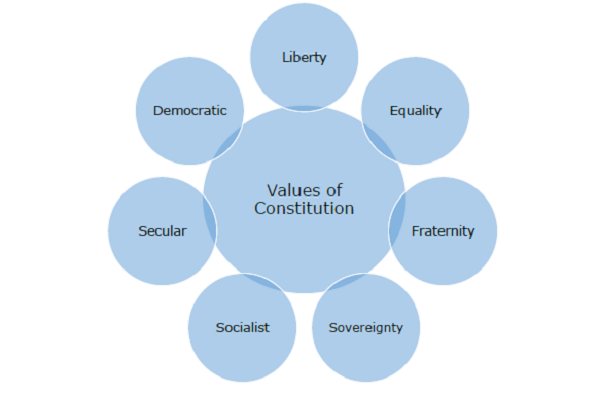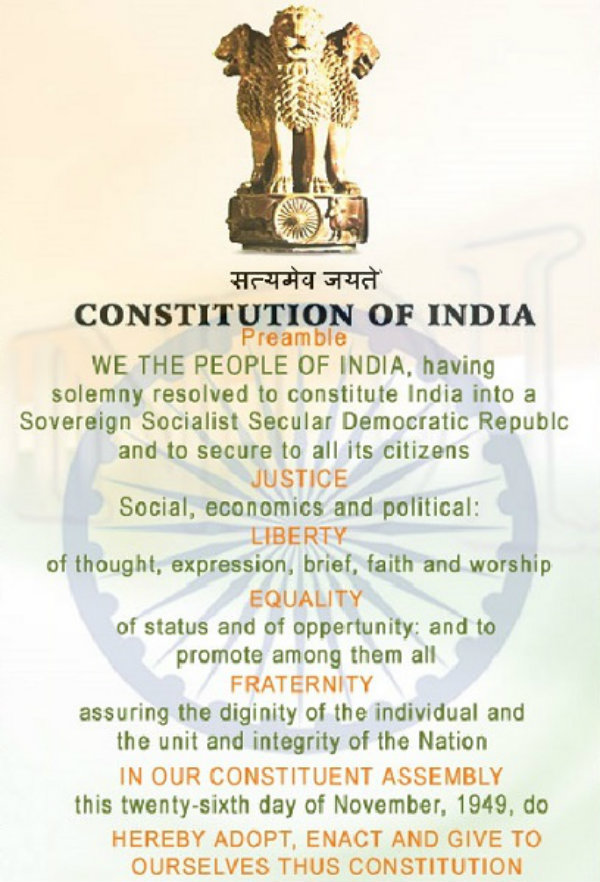
- Indian Polity - Home
- Indian Polity - Introduction
- Indian Polity - Constitution Formation
- Indian Polity - Constitution Features
- Guiding Values of the Constitution
- Indian Polity - Sources of Constitution
- Polity - How the Constitution Works
- Indian Polity - Union & Its Territory
- Indian Polity - Citizenship
- Indian Polity - Fundamental Rights
- Indian Polity - Directive Principles
- Indian Polity - Fundamental Duties
- Indian Polity - Union Executive
- Indian Polity - Union Legislature
- Indian Polity - Local Government
- Indian Polity - Judiciary
- Indian Polity - Federal System
- Indian Polity - Center State Relation
- Indian Polity - Emergency Provision
- Indian Polity - Elections System
- Indian Polity - Political Parties
- Constitutional Amendments
- Indian - Constitutional Schedules
- Indian Polity - Separation of Powers
- Indian Polity - Parts of Constitution
- Polity - International Organizations
- Indian Polity - Environment & Politics
- Indian Polity - Globalization
- Indian Polity - Popular Movements
- Indian Polity - Foreign Policy
Guiding Values of the Constitution
Introduction
India is a Republic Nation and the President of India is the head of the nation. He/she is elected every five years.
The provisions are written in the Constitution to guarantee Justice for all. No one can be discriminated on the grounds of caste, religion, and gender. Social inequalities on any grounds of caste, religion, and gender are strictly prohibited.
Welfare for all citizens is the prime objective of the Government; besides, the government also needs to give special attention, particularly to the underprivileged sections of the society.
Guiding Values of the Constitution
The important values of Indian constitutions are depicted in the following illustration −

Liberty
The Constitution provides every citizen a number of liberties and freedoms under Article 19 to 21, 21A, and 22. It is established that no unreasonable restrictions can be imposed upon citizens to regulate their freedom.
Right to Freedom under Article 19 includes −
The right to freedom of speech and expression;
The right to form association;
The right to move freely;
Reside in any part of the country; and
The right to practice any profession, occupation, or business.
Equality
The Constitution states that all citizens are equal before the law and the government should ensure that the traditional practice of social inequalities on the grounds of caste, religion, and gender has to be ended.
Right to Equality is enshrined under Articles 14 to 18 of the Indian Constitution of India, which guarantees the right to equality to all persons and prohibits any kind of discrimination against any citizen on any of the grounds of religion, race, caste, gender, and place of birth.
Article 14 provides that all persons are equal before the law. This means that all persons shall be equally protected by the laws of the country.
Article 15 states that no citizen can be discriminated against on the basis of his/her religion, race, caste, sex, or place of birth.
Article 16 states that the State cannot discriminate against anyone in matters of employment.
Article 17 abolishes the practice of untouchability from India. It provides that every person has access to all public places including playgrounds, hotels, shops, etc.
Right against Exploitation is enshrined under Article 23 to 24 of the Constitution of India. It provides fundamental right against exploitation to every citizen of India.
Article 23 of the Constitution provides for prohibition of any kind of forced labor and any violation of this provision shall be an offence punishable in accordance with the law.
Article 24 protects the children by stating that no child below the age of 14 shall be employed to work in any factory or mines or any other hazardous employment.
Fraternity
All the Indians are members of a family, no one is inferior or superior, all are equal and have same rights and duties.
Sovereignty
The government of India is free to take any decision on internal as well as external matters and no external power can dictate it.
Socialist
In a socialist country, citizens have the right to property but the government should regulate it by law, the socio-economic activities to reduce inequalities in the society and hence, every citizen has equal right to share the resources of the country.
The concept of social justice was adopted by the 42nd amendment of Constitution that enables courts to uphold provisions to remove economic inequalities in our society.
Secular
India is a secular country. There is no official religion of the government and the government treats all the religions equally.
Articles 25 to 28 provide Right to freedom of Religion for every citizen. This is a Fundamental Right that allows every individual a freedom to live by their religious beliefs and practices as they interpret these beliefs.
Cultural and Educational Rights (Article 29 to 30) state that all minorities, religious or linguistic, having a distinct language, script or culture of its own, (they) can set up their own educational institutions in order to preserve and develop their language, script, or culture.
Democratic
The democratic system of government runs according to some basic principles, which are collectively called as Rule of Law.
In a democratic form of the government, the people of the country enjoy equal political rights, choose to elect and change their representatives, and hold them accountable.
Preamble

The Indian democracy is founded on those values that had inspired and guided the freedom struggle.
The Indian Constitution embedded the values in its Preamble. Therefore the Preamble emanates lights that glitter all the articles of the Indian Constitution.
The Preamble provides a short introductory statement of the basic values of the constitution to start with. In other words, it is the Soul of the Constitution.
It is the preamble that provides a standard to examine and evaluate any law and action of the government to judge its validity and sanctity.